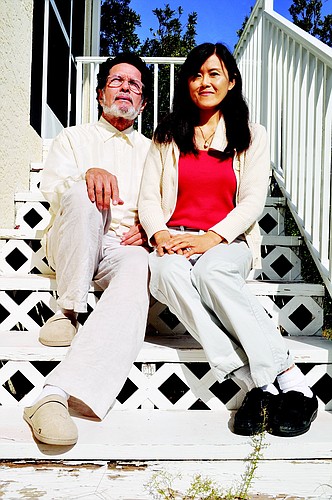- April 17, 2024
-
-
Loading

Loading

Sarasota loves its dance.
Ballet. Modern dance. Ballroom dance. Butoh dance. Burlesque dance. The list goes on.
Now we can add Balinese dance to the mix.
Meet Surapsari and Indra Sampranata, founders of the Purnama Sari Balinese Dance Company.
The husband-and-wife duo relocated this fall from Bali to a quiet subdivision in Nokomis. They brought with them an impressive collection of traditional masks, a closet full of colorful costumes and 12 years of professional Balinese dance experience that’s so deeply rooted in a spiritual-belief system that dancing is as much who they are as what they do.
Within minutes of sitting down with the couple in their quiet canal-front living room, you sense that Balinese dancing is the fabric of their being.
The pair, who met in 1997 as graduate students in Cambridge, Mass., wouldn’t have it any other way.
“I think there’s this ordinary life that we all have,” Sampranata says. “And often times we get caught up in the hardware. Balinese dance stirs the inner mystery so that we can begin to marvel at the unknown.
Some people call it the universe. Other people call it God. For me, it’s so important to communicate with that world.”
To illustrate his point, Sampranata, a native of Puerto Rico, raps his knuckles on the coffee table in front of him.
“Balinese dance helps us break identification with the form,” he says. “It’s the embodiment of mysticism.”
Balinese dance originated as a way to communicate between the real world (“Sekala”) and the spiritual world (“Niskala”), which means the dance was never intended to be entertainment.
Like any ceremonial dance, it was intended for the deities.
Before each performance, Surapsari and Sampranata mist their costumes and the stage with holy water.
Throughout the performance Sampranata dons different masks that represent the faces of gods, heroes, kings, warriors, Balinese elders and street people.
Surapsari performs ritualistic gestures, sporadic facial expressions and intense eye movements.
Often, their 12-year-old son, a student at Island Village Montessori School, joins the couple on stage. Like his parents, he also has a stage name: Dewa Bumi.
If the program includes an elaborate dance drama, the cast can be padded with additional dancers, although Surapsari and Sampranata have had a hard time finding skilled Balinese dancers in Sarasota.
“Here in the West we dance for the audience,” says Surapsari, who’s originally from Japan. “In Bali, they dance for the ancestors.”
When she began studying the art 12 years ago, she had a hard time mastering the intense eye movements that accompany many of the gestures.
“It’s not an easy dance to run,” Surapsari says. “I’ve taught workshops where people come with such excitement and leave with disappointment because the body gets into such an unnatural form. The music alone takes several years to learn.”
She once taught the techniques to a friend who had studied modern dance.
The friend quit after one lesson. According to Surapsari, she found the dance to be too stifling.
“We need to empty our ego and let the spirit and the character of the dance come to the body,” Surapsari says. “We’re dancing for the gods, whether somebody shows up or not.”
WHAT’S UP WITH THE MASKS?
Regarded as sacred purveyors of ancient spirits, Balinese dance masks are hand-carved by Balinese dance priests from a soft wood called “pule” and then covered in endless coats of acrylic paint.
The men select the materials on specific dates and perform a prayer ritual before carving.
Although ancient kings and gods inspired most of the masks in Indra Sampranata’s collection, some of the faces have been modeled after clowns and villagers with physical deformities.
Sampranata realizes some of these faces might scare small children.
In fact, that’s the point.
“The idea is to scare the nasty energy away,” Sampranata says.
IF YOU GO
Purnama Sari Balinese Dance Company will perform dances from “The Island of the Gods” at Rising Tide International Spiritual Center, 5102 Swift Road, Sarasota. Tickets are $15 for adults and $8 for children. For more information, call 320-9666 or visit www.purnamasaribali.com.